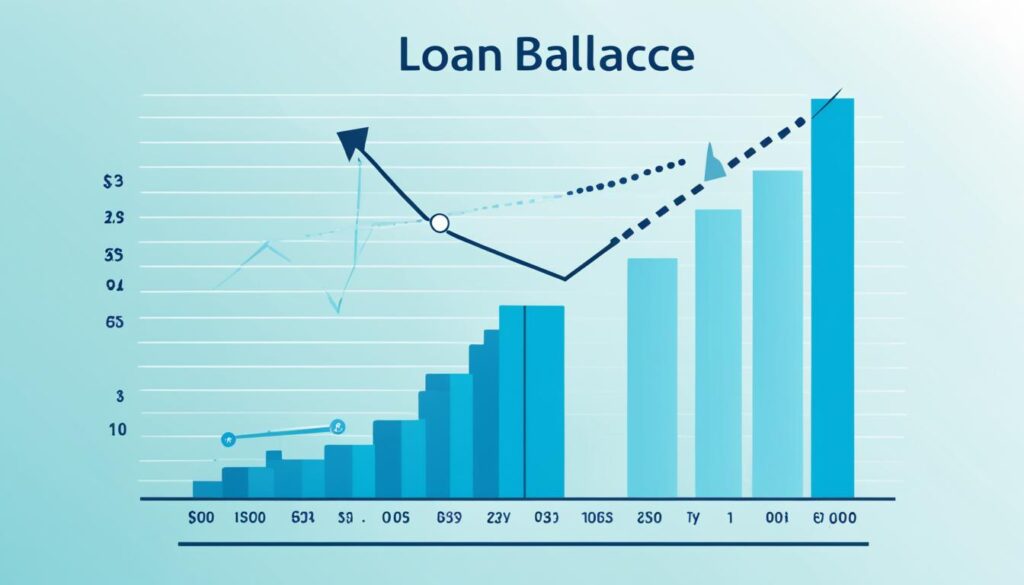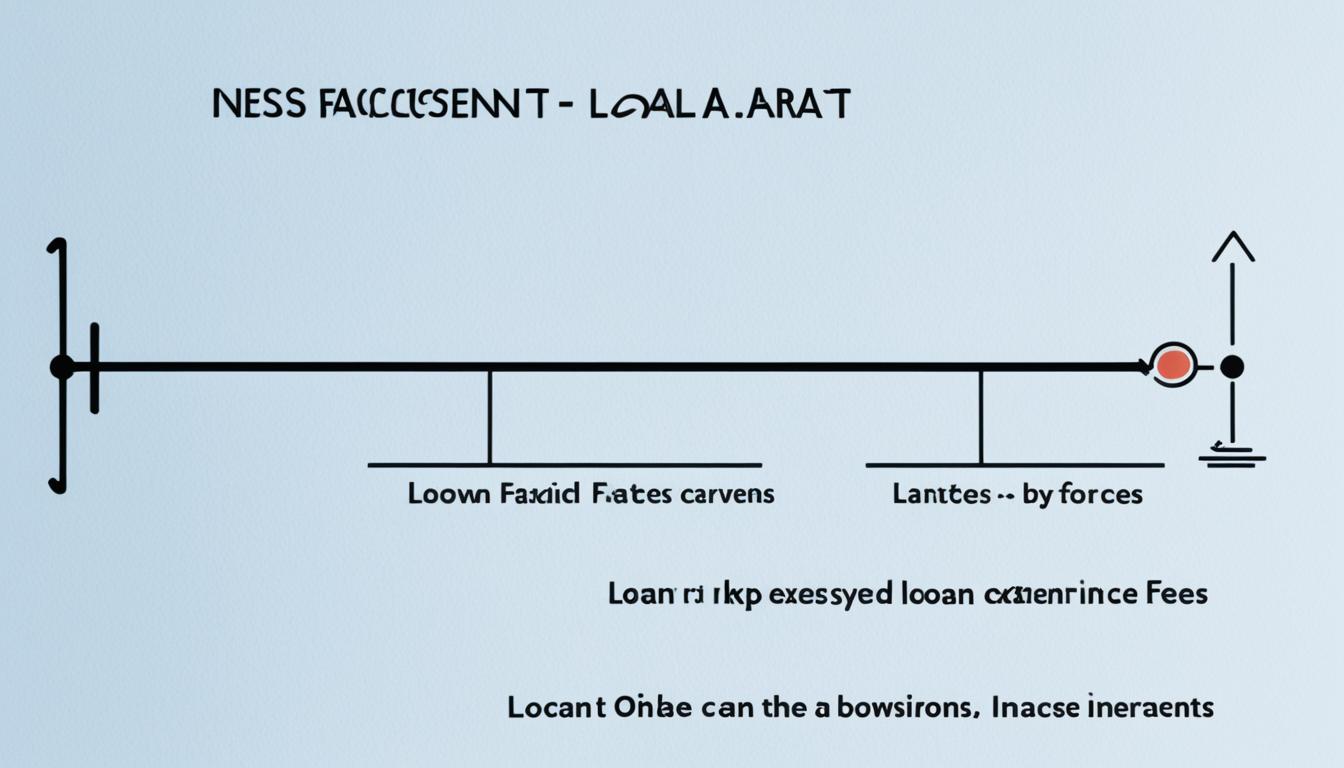“As an Amazon Associate I earn from qualifying purchases.”
Looking into getting a loan means you should know some things. Like how loan principal, interest rates, fees, and how often you pay back can affect what you owe. It’s key to figure out how these raise your loan’s total. This knowledge helps you handle your money better.
Key Takeaways
- It’s vital to understand loan principal and interest rates to keep your balance in check.
- Fees and charges can really add up, making your loan more expensive1.
- How and when you repay impacts your balance because of possible late fees1.
- Variable interest rates change over time, which can affect your monthly payments and total loan cost1.
- Knowing how these factors work together can help you make smarter financial choices and manage loans well.
Understanding Loan Balance Dynamics
To really get how your loan amount changes, it’s key to know about a few things. First is the original money you borrow. This is called the loan principal. Then, there are extra costs like interest rates and the annual percentage rate (APR).
The Role of Loan Principal
The loan principal is your debt’s starting point. It’s what you promise to pay back, not counting interest or fees. When you make payments, some of it lowers the principal. This makes your total loan amount go down.
Yet, if interest grows and you don’t pay it, it adds to your principal. This makes paying back harder. To keep on top of your loan, try to pay more towards the principal early on. This shortens the loan’s life and cuts down total costs2.
Impact of Interest Rates and APR
Interest rates add to your principal regularly. A higher rate means paying more in the long run. The APR gives a fuller picture of your costs. It includes your interest rate and other loan fees. Knowing about rates helps you choose better loan options2.
Finding low rates, boosting your credit score, and picking short-term loans can lessen interest costs. Taking these steps can greatly reduce your loan’s financial weight2.
How Variable Interest Rates Contribute to Balance Growth
It’s vital to understand how variable interest rates affect your finances, particularly for loan balance growth. These rates change with the market. When they rise, your loan balance follows. This is often seen with adjustable-rate mortgages and different variable rate loans3.
The Federal Reserve changes the federal funds rate, which alters the prime rate. This, in turn, impacts your loan rates. A spike in these rates means your monthly payments might fall short of covering the interest. Your loan balance then increases3. Also, variable rate loans like personal loans and credit cards can lead to more costs overtime due to rate changes4.
Adjustable-rate mortgages, such as the 5/1 ARM, provide early savings when rates are low. However, they can be risky if rates rise, possibly causing your payments to jump significantly4.
Variable rate loans can have long-term benefits. Research shows that over time, these loans might result in lesser interest charges compared to fixed-rate loans despite the risk of higher rates4.
Being knowledgeable about loans with variable interest rates is crucial. It helps in making wise decisions. By staying proactive and informed, you can protect your financial future from sudden hardships34.
- Review your loan agreement to understand any potential impacts of rate increases.
- Consider refinancing options if you anticipate a significant rise in interest rates.
- Regularly monitor the market and adjust your budget to accommodate potential increases in payments.

What Increases Your Total Loan Balance? Fees and Penalties Explained
Understanding how fees and penalties add to your loan balance is key. Various factors can make your loan bigger. It’s vital to know your loan terms and how you pay back your loan.
Common Fees That Affect Loan Balance
Some fees might seem small, but they greatly increase your loan balance. Late fees are common and costly if you miss a payment deadline. They make your loan more expensive right away and over time1. Payment processing fees and origination fees may start small but add up, raising the total cost of your loan.
Understanding Late Payment Repercussions
Late payments come with immediate penalties and long-term impacts. Missing payments can hurt your credit for up to seven years. This makes borrowing more costly in the future5. Each missed payment also adds extra fees to your balance, which can grow significantly5.
When payments are late, unpaid interest might be added to your loan’s principal. This makes your overall loan balance and monthly payments go up. It results in a more expensive loan in the end1.
To stop your loan balance from growing, try setting up automatic payments. Even paying the minimum each month helps. It avoids late payments and extra fees, keeping your balance in check.
| Fee Type | Description | Impact on Loan Balance |
|---|---|---|
| Late Fees | Charged when payment deadlines are missed | Increases total loan balance and can affect credit score |
| Interest Capitalization | Unpaid interest added to the principal during deferment | Increases monthly payments and overall loan cost |
| Origination Fees | One-time charges at the inception of the loan | Raises initial loan balance, affecting total repayment amount |
Staying informed about fees helps you make smarter loan choices. You can better manage your loans and lower your balance by knowing these costs.
The Ripple Effects of Capitalized Interest
Grasping the idea of capitalized interest is crucial when managing loans, especially with loan deferment and loan forbearance. This happens when unpaid interest gets added to the loan’s main amount. This action turns unpaid interest into part of the principal, slowly growing the debt. It’s key to understand how low interest rates, meant to boost the economy, can end up raising loan costs by making you owe more for longer6.
Interest Capitalization During Deferment or Forbearance
Loan deferment and loan forbearance offer a pause on payments during tough times. But this break is short and can trick you. Even though payments halt, interest piles up. After the break, this added interest bumps up the principal. As a result, the loan balance grows, making loan costs jump. This shows why it’s important to plan your finances well before opting for deferment or forbearance.
Compounding: How Unpaid Interest Increases Loan Costs
Compounding interest is key to seeing how unpaid interest boosts a loan’s total cost. Unpaid interest, from deferring payments or just not paying, joins the original amount owed. Then, every new interest calculation is based on this bigger amount, making the debt balloon. Avoiding this scary debt cycle means keeping up with payments or picking plans with less frequent interest adds.
To truly understand how capitalized interest changes loan repayments, check out the interactive element below:
| Scenario | Total Principal | Interest Rate | Compounded Total after 1 Year |
|---|---|---|---|
| Standard Repayment | $10,000 | 5% | $10,500 |
| With Capitalization | $10,500 | 5% | $11,025 |
It’s vital to know how interest rates shape the financial market when looking into loan management strategies like capitalized interest. This knowledge empowers borrowers to make smart choices and handle their loan responsibilities better.
Minimum Payments Versus Loan Balance Reduction

Handling your debts wisely is key. Knowing how minimum payments affect your finances in the long run is important. This part talks about the cons of small payments and how to decrease your loan balance better and faster.
The Pitfalls of Making Only Minimum Payments
Paying just the minimum on loans might look easy but it stretches out repayment time and ups total interest. With loans like adjustable-rate mortgages, minimum payments can fall short, letting interest pile up and grow the balance1. Also, paying less than the minimum can lead to penalties, harm your credit score, and increase what you owe1.
Strategies for Accelerating Loan Repayment
Improving how you pay off loans can quickly lower your balance and interest. Paying extra reduces what’s left, which then lowers the interest on future payments1. Paying more than the minimum every month clears debt quicker and saves on interest1.
Automated payments are smart too; some lenders give discounts for using them, which cuts down your loan costs1. Loan forgiveness, especially for student loans, can let some pay back less than borrowed1. Refinancing for a better interest rate or terms saves money over time by replacing old debts with new, better ones1.
Getting the hang of these downfalls and employing different repayment tactics can really help lower your loan balance. Check out loan balance reduction strategies for more tips and advice.
Conclusion
Managing your loan balance is tricky. It’s important to know about the loan principal, interest rates, and APR. Understanding these can help you handle your loan better. Also, fees and penalties play a big part in your loan’s size. They can make your balance go up or stay the same, affecting your money health.
When you don’t pay interest during breaks like forbearance, it gets added to your main loan amount. This makes what you owe bigger7. Paying more than the minimum can help lower your loan faster. It saves money on interest over time. The SAVE IDR plan shows how to cut down interest and keep your loan from growing7.
The best way to lower your loan is to look at all these points. By making smart choices, like choosing good lenders and using online checks for loan options without hurting your credit8, you can manage and reduce your loan well. This doesn’t just save money. It also helps you reach bigger money goals and secure your financial future.
FAQ
What increases my total loan balance?
What is the role of loan principal in determining the loan balance?
How do interest rates and APR impact my loan balance?
Do fees and charges affect my loan balance?
How do late payments impact my loan balance?
What are the implications of capitalized interest on my loan balance?
What are the pitfalls of making only minimum payments?
What strategies can I use to accelerate loan repayment and reduce my balance?
How can I effectively manage my loan balance?
Source Links
- https://www.capitalone.com/learn-grow/money-management/what-increases-total-loan-balance/
- https://1firstcashadvance.org/articles/what-increases-your-total-loan-balance/
- https://www.principal.com/individuals/build-your-knowledge/what-should-you-do-when-interest-rates-go-or-down
- https://www.investopedia.com/ask/answers/07/fixed-variable.asp
- https://www.integracredit.com/blog/what-increases-your-total-loan-balance
- https://www.investopedia.com/articles/stocks/09/how-interest-rates-affect-markets.asp
- https://www.nerdwallet.com/article/loans/student-loans/what-increases-your-student-loan-balance
- https://www.iifl.com/blogs/other/outstanding-balance-what-it-means-and-how-it-affects-you
“As an Amazon Associate I earn from qualifying purchases.”

